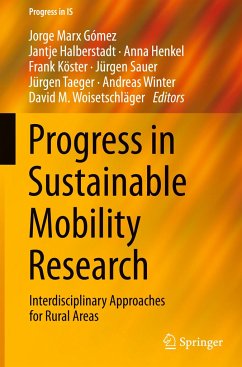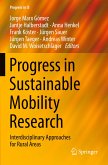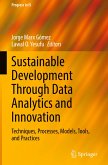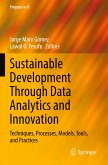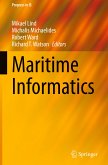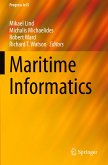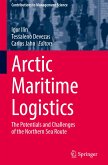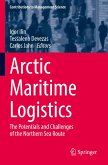Progress in Sustainable Mobility Research
Interdisciplinary Approaches for Rural Areas
Herausgegeben:Marx Gómez, Jorge; Halberstadt, Jantje; Henkel, Anna; Köster, Frank; Sauer, Jürgen; Taeger, Jürgen; Winter, Andreas; Woisetschläger, David M.
Progress in Sustainable Mobility Research
Interdisciplinary Approaches for Rural Areas
Herausgegeben:Marx Gómez, Jorge; Halberstadt, Jantje; Henkel, Anna; Köster, Frank; Sauer, Jürgen; Taeger, Jürgen; Winter, Andreas; Woisetschläger, David M.
- Gebundenes Buch
- Merkliste
- Auf die Merkliste
- Bewerten Bewerten
- Teilen
- Produkt teilen
- Produkterinnerung
- Produkterinnerung
This book presents the outcomes of the trans- and interdisciplinary research project NEMo (Nachhaltige Erfüllung von Mobilitätsbedürfnissen im ländlichen Raum - Sustainable Fulfilment of Mobility Needs in Rural Areas). Due to demographic change, it is becoming increasingly difficult for rural districts and communities to maintain a basic set of public transport services such as bus and train transit without encountering issues regarding necessary social participation, sensible regional value creation and, last but not least, achievable environmental protection goals. At the same time, the…mehr
Andere Kunden interessierten sich auch für
![Progress in Sustainable Mobility Research Progress in Sustainable Mobility Research]() Progress in Sustainable Mobility Research116,99 €
Progress in Sustainable Mobility Research116,99 €![Sustainable Development Through Data Analytics and Innovation Sustainable Development Through Data Analytics and Innovation]() Sustainable Development Through Data Analytics and Innovation116,99 €
Sustainable Development Through Data Analytics and Innovation116,99 €![Sustainable Development Through Data Analytics and Innovation Sustainable Development Through Data Analytics and Innovation]() Sustainable Development Through Data Analytics and Innovation116,99 €
Sustainable Development Through Data Analytics and Innovation116,99 €![Maritime Informatics Maritime Informatics]() Maritime Informatics116,99 €
Maritime Informatics116,99 €![Maritime Informatics Maritime Informatics]() Maritime Informatics116,99 €
Maritime Informatics116,99 €![Arctic Maritime Logistics Arctic Maritime Logistics]() Arctic Maritime Logistics123,99 €
Arctic Maritime Logistics123,99 €![Arctic Maritime Logistics Arctic Maritime Logistics]() Arctic Maritime Logistics123,99 €
Arctic Maritime Logistics123,99 €-
-
-
This book presents the outcomes of the trans- and interdisciplinary research project NEMo (Nachhaltige Erfüllung von Mobilitätsbedürfnissen im ländlichen Raum - Sustainable Fulfilment of Mobility Needs in Rural Areas). Due to demographic change, it is becoming increasingly difficult for rural districts and communities to maintain a basic set of public transport services such as bus and train transit without encountering issues regarding necessary social participation, sensible regional value creation and, last but not least, achievable environmental protection goals. At the same time, the demand for mobility in rural areas will continue to rise in the future, e.g. due to the concentration of medical care facilities and shopping centres close to cities.
Focusing on the development of sustainable and innovative mobility services and business models, this book explains how new mobility offers can be created in which citizens themselves become mobility providers. To do so,it combines the findings of the individual research groups with external contributions from science and practice.
Focusing on the development of sustainable and innovative mobility services and business models, this book explains how new mobility offers can be created in which citizens themselves become mobility providers. To do so,it combines the findings of the individual research groups with external contributions from science and practice.
Produktdetails
- Produktdetails
- Progress in IS
- Verlag: Springer / Springer International Publishing / Springer, Berlin
- Artikelnr. des Verlages: 978-3-030-70840-5
- 1st edition 2021
- Seitenzahl: 192
- Erscheinungstermin: 24. Mai 2021
- Englisch
- Abmessung: 241mm x 160mm x 17mm
- Gewicht: 459g
- ISBN-13: 9783030708405
- ISBN-10: 3030708403
- Artikelnr.: 61096683
- Herstellerkennzeichnung Die Herstellerinformationen sind derzeit nicht verfügbar.
- Progress in IS
- Verlag: Springer / Springer International Publishing / Springer, Berlin
- Artikelnr. des Verlages: 978-3-030-70840-5
- 1st edition 2021
- Seitenzahl: 192
- Erscheinungstermin: 24. Mai 2021
- Englisch
- Abmessung: 241mm x 160mm x 17mm
- Gewicht: 459g
- ISBN-13: 9783030708405
- ISBN-10: 3030708403
- Artikelnr.: 61096683
- Herstellerkennzeichnung Die Herstellerinformationen sind derzeit nicht verfügbar.
Prof. Dr. Jorge Marx Gómez is a professor and chair of Business Information Systems / Very Large Business Applications (VLBA) at the Carl von Ossietzky University of Oldenburg, Germany. He is furthermore the director of the Center for Environmental and Sustainability Research (COAST) at Carl von Ossietzky University of Oldenburg and board member of the energy group at OFFIS-Institute. His research interests include business information systems, federated ERP-systems, business intelligence, data science, applied AI, interoperability, environmental management information systems, ICT for sustainability and e- and mobile-commerce. Prof. Marx Gómez has worked as guest lecturer in different countries and has successfully coordinated many (national and international) research and capacity building projects. Prof. Dr. Jantje Halberstadt is a professor of Economics and Sustainability at the University of Vechta, Germany, where she is also Dean of Studies at the Faculty of Education and Social Sciences. Her main research interests are in the area of entrepreneurship and management, particularly transformational sustainability entrepreneurship related to various fields, such as ICT, agriculture and food, mobility, and gender studies. She is Vice-Director of the ISPA institute (Institute for Structural research and Planning in Agricultural and intensive areas) and board member of FGF e.V. (Förderkreis Gründungs-Forschung), Germany`s leading scientific association for entrepreneurship, innovation and SMEs, as well as of the Yunus Centre for Social Business and Values. Prof. Halberstadt is also lecturer abroad and leads several trans- and interdisciplinary research projects with national and international groups. She holds a PhD from the Carl von Ossietzky University of Oldenburg and was Junior Professor for Social Entrepreneurship at the Leuphana University in Lüneburg where she still is Guest Professor. Prof. Dr. Anna Henkel is a professor at the University of Passau, Germany, and helds the Chair of Sociology with a focus on Sociology of Technology and Sustainable Development since 2019. Prior to this, she was assistant professor of Social Theory at the Carl von Ossietzky University of Oldenburg and professor of Cultural and Media Sociology at the Leuphana University of Lüneburg. Her research focuses on sociological theory as well as knowledge, materiality and sustainability research and digitization. Prof. Dr. Frank Köster is head of business development at the Institute of Transportation Systems of the German Aerospace Center (DLR) in Braunschweig, Germany. His current research activities are addressing the application domains automotive, railway systems, intermodal transport/mobility, public transport and traffic management. In particular, Frank Köster is focussing on automated and connected mobility and transport solutions in the mentioned domains as well as on the topic of digitization of the traffic system. In addition to his engagement at the DLR, Frank Köster is also professor at the Carl von Ossietzky University of Oldenburg where he is head of the Department on Intelligent Transportation Systems. Frank Köster is a member of the ASAM Board of Directors and Advisory Professor at Tongji University in China. He is coordinator of the Mobility Branch within GAIA-X and he is member of the national Round Table on Automated and Connected Driving. He represents the DLR at different European and international institutions (e.g. ERTICO) as well as in several research and development initiatives. Prof. Dr. Jürgen Sauer is an associate professor in the system analysis and -optimization group within the Department of Computer Science of the Carl von Ossietzky University of Oldenburg, Germany. He holds a diploma in Computer Science from the Technical University of Dortmund and a Dr.-Ing. in Computer Science from the Carl von Ossietzky University of Oldenburg. After working as a senior research assistant in the information systems area in the software engineering lab of the Department of Computer Science he had been the head of the computer centre of the Carl von Ossietzky University of Oldenburg subsequently an assistant professor in the business informatics group. He now works on topics of artificial intelligence systems in supply chain management, especially intelligent planning and scheduling systems in logistics and manufacturing. He is the speaker of the special interest group in planning, scheduling and configuration within the Artificial Intelligence section of the German Computer Society (Gesellschaft fuer Informatik, GI) and has organized several workshops on the topics of planning, scheduling and configuration. Univ.-Prof. Dr. Prof. h.c. Jürgen Taeger was full professor and head of chair for Private Law, Commercial and Business Law, Legal Informatics, Department of Law, Faculty of Informatics, Economics and Law at the Carl von Ossietzky University of Oldenburg, Germany (1997-2020), and was director of the Center of Law of the Information Society. He is a visiting professor at the University of Cluj (Romania). He studied both Law and Political Science at the Free University of Berlin and Leibniz University of Hannover. Before 1997 he took up deputy professorships at the Universities of Lüneburg, Frankfurt (Oder), Greifswald and Hannover. Taeger was habilitated in 1991 with a thesis on non-contractual liability for defective computer programs and received his doctorate with a thesis on the disclosure of trade and business secrets. Since 2004 he is chairman of the board of the German Foundation for Law and Informatics. His main interests are in the fields of German Private Law, Data Protection Law, and Commercial and Business Law Prof. Dr. Andreas Winter is chair of the Software Engineering Group at Carl von Ossietzky University of Oldenburg, Germany. He teaches on software engineering foundations, requirements engineering and management, software architecture, and software analysis and transformation. Current research includes modeling and meta-modeling, sustainable software architectures, software evolution and the development of smarter systems. He was involved in the development of the GUPRO meta-model based framework for program comprehension, the design of the graph interchange language GXL, the development of the SOAMIG software migration methodology, the analysis and optimization of energy efficiency of software systems, the design of sustainable software architectures for smarter systems and the design of collaborative modeling tools. Andreas Winter served in program and organization committees of various national and international conferences and workshops. Among others, he served as program-, general-, and steering committee chair of the European Conference on Software Maintenance and Reengineering (CSMR). He is founding member of the GI group on software reengineering and served as member at the large of the IEEE-CS Technical Activities Committee. Prof. Dr. David Woisetschläger joined Technical University of Braunschweig, Germany, as a professor and chair in Services Management and Director of the Institute for Automotive Management and Industrial Production in 2011. Before, he worked as Assistant Professor at Technical University of Dortmund, Germany. He earned his doctorate degree from the University of Münster. His research interests lie primarily in the fields of service innovation, branding, and customer relationship management with a particular interest in empirical studies on communications and mobility services. Besides his academic work, he is also a consultant for companies in the automotive and telecommunications sectors. His work in these domains has been published in international marketing journals such as the Journal of the Academy of Marketing Science, Journal of Business Research, Journal of Marketing, Journal of Retailing, and Psychology & Marketing.
Research Approaches and Objectives of Project NEMo.- The Future of Mobility in Rural Areas: Participation and Co-creation in a Real-world laboratory.- The Social Practice of Community Mobility in Rural Areas.- From Empirical Data to Operational Models: An Approach for the Development of a Decision-making Component for an Agent-based Mobility Simulation from Quantitative Survey Data.- Using an Imovative Approach for the Structural Support of Business Idea Generation.- Mobility in Rural Areas as it Relates to the Agricultural and Food Industries and People Employed in Them.- A Sustainable Software Architecture for Mobility Platforms.- Mobility Platforms as a Key Element for Sustainable Mobility.- The Erasure Obligation Independent of a Request.
Research Approaches and Objectives of Project NEMo.- The Future of Mobility in Rural Areas: Participation and Co-creation in a Real-world laboratory.- The Social Practice of Community Mobility in Rural Areas.- From Empirical Data to Operational Models: An Approach for the Development of a Decision-making Component for an Agent-based Mobility Simulation from Quantitative Survey Data.- Using an Imovative Approach for the Structural Support of Business Idea Generation.- Mobility in Rural Areas as it Relates to the Agricultural and Food Industries and People Employed in Them.- A Sustainable Software Architecture for Mobility Platforms.- Mobility Platforms as a Key Element for Sustainable Mobility.- The Erasure Obligation Independent of a Request.

